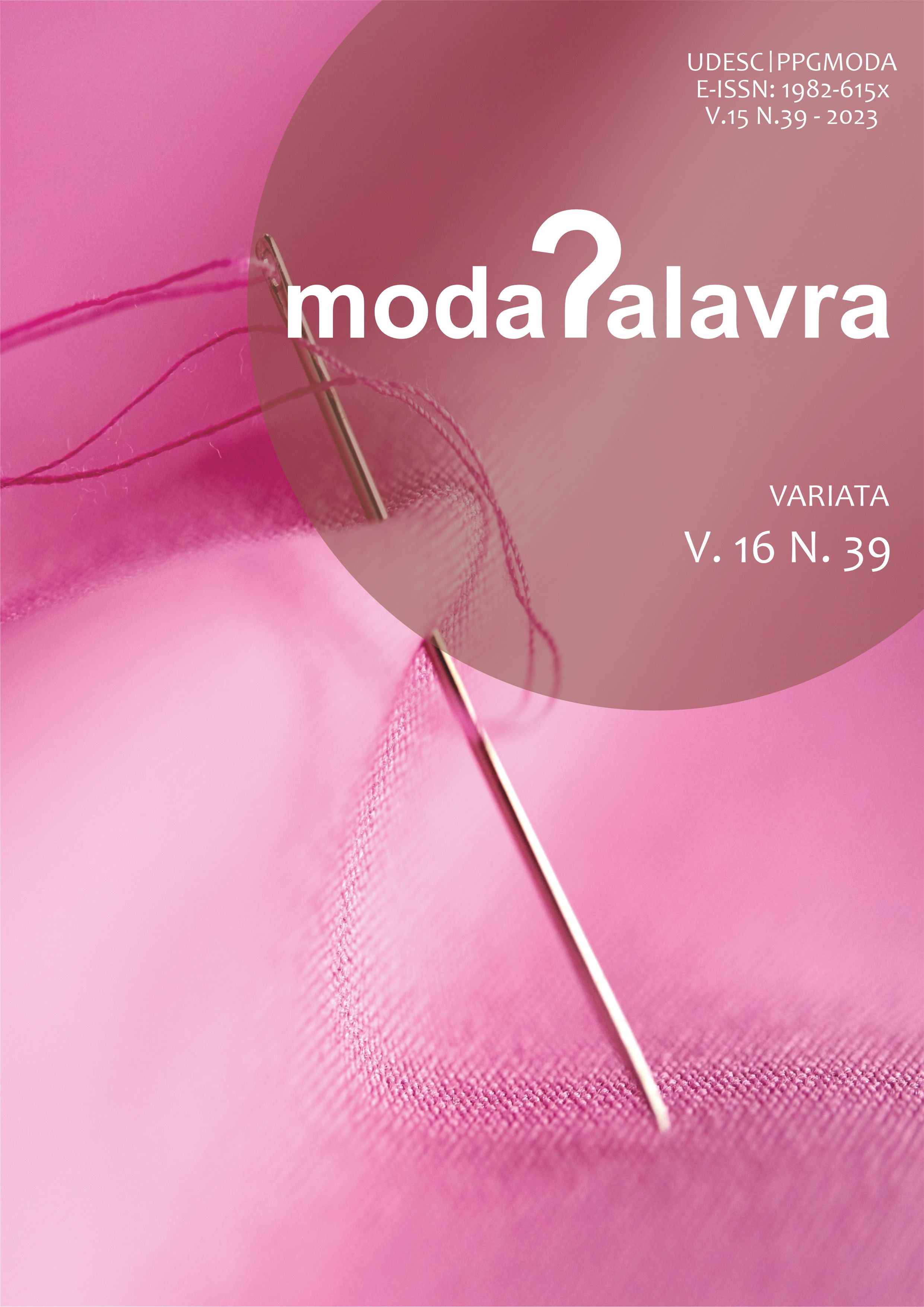Scenarios in fashion collection development: from the tradition of industrial design to imagination
DOI:
https://doi.org/10.5965/1982615x16392023e0007Keywords:
scenarios, Melissa , fashion collection developmentAbstract
The essay discusses the process of scenario building in fashion design. It criticizes the methodologies used in this disciplinary field, whose foundations, at least in part, are situated in the tradition of industrial design. To do so, it compares Löbach’s (2001) proposal for industrial product configuration with Treptow’s (2013) proposal for collection development, highlighting structural similarities. Therefore, the essay demonstrates the possibility for fashion design to seek alternative paths to the tradition of industrial design, by valuing the potential for imagination that is inherent in scenarios. This possibility is illustrated through the case of Melissa, interpreted as an emblematic example of an organization that operates through scenarios in the development of a collection, and collection after collection, in the construction of its brand identity. The essay proposes opening a dialogue with fashion designers and professors, encouraging them to reevaluate their practices and foster imagination.
Downloads
References
CASA DARWIN. Plastic Dreams: campanha chega a 30 países. Disponível em: https://www.casadarwin.com.br/plasticdreams. Acesso em: 07 abr. 2022.
COUTINHO, André; PENHA, Anderson. Design Estratégico: direções criativas para um mundo em transformação. Rio de Janeiro: Alta Books, 2018.
FRANZATO, Carlo et al. Inovação Cultural e Social: design estratégico e ecossistemas criativos. In: FREIRE, Karine (org.). Design Estratégico para a Inovação Cultural e Social. São Paulo: Kazuá, 2015. Disponível em: https://bit.ly/3K0zNNL. Acesso em: 07 maio 2023.
LÖBACH, Bernd. Design Industrial: bases para a configuração dos produtos industriais. São Paulo: Blucher, 2001.
MANZINI, Ezio; JÉGOU, François. Design degli scenari. In: BERTOLA, Paola; MANZINI, Ezio (org.). Design Multiverso. Notas de fenomenologia do design. Milano: Edizioni POLI.design, 2006.
MANZINI, Ezio; JÉGOU, François. Sustainable Everyday. Scenarios of Urban Life. Milano: Edizioni Ambiente, 2003. Disponível em: https://www. strategicdesignscenarios.net/sustainable-everyday-book/. Acesso em: 05 abr. 2021.
MAURI, Francesco. Progettare progettando strategia: il design del sistema prodotto. Milano: Dunod, 1996.
MORAES, Dijon de. Metaprojeto: o design do design. São Paulo: Blücher, 2010.
PERINI, Anerose. Cenários Futuros Para o Desenvolvimento de Coleção de Moda Slow: estudo de caso Brisa Slow Fashion. ModaPalavra e-periódico, v. 11, n. 22, p. 408-430, 2018. Disponível em: https://doi. org/10.5965/1982615x11222018408. Acesso em: 07 abr. 2022. DOI: https://doi.org/10.5965/1982615x11222018408
QUEIROZ, Cyntia; BASSO, Aline Teresinha. Moda e metodologia: o Design como mediador. ModaPalavra e-periódico, v. 9, n. 17, p.90-118, 2016. Disponível em: https://doi.org/10.5965/1982615x09172016091. Acesso em: 07 abr. 2022. DOI: https://doi.org/10.5965/1982615x09172016091
SCALETSKY, Celso (org.). Design Estratégico em Ação. São Leopoldo: Editora Unisnos, 2016.
TREPTOW, Doris. Inventando Moda. Planejamento de Coleção. Brusque: Edição da Autora, 2013.
VISONÁ, Paula. Sobre o Estar-Junto-Com Como Tendência Sociocultural e Coletivos Criativos: uma proposta interdisciplinar de metodologia para identificação de tendências visando cenários de futuro. ModaPalavra e-periódico, v.11, n. 22, p.113-144, 2018. Disponível em: https://doi. org/10.5965/1982615x11222018113, acesso em: 07 abr. 2022. DOI: https://doi.org/10.5965/1982615x11222018113
ZURLO, Francesco. Design Strategico. In: XXI Secolo. V. IV: Gli spazi e le arti. Roma: Enciclopedia Treccani, 2010. Disponível em: http://www.treccani. it/enciclopedia/design-strategico_%28XXI_Secolo%29/. Acesso em: 07 abr. 2022.
Published
How to Cite
Issue
Section
License
Copyright (c) 2023 Carlo Franzato

This work is licensed under a Creative Commons Attribution-NonCommercial 4.0 International License.
When submitting an article for publication in ModaPalavra e-periodico, the author (s) agree (s) with the following terms:
- Authors maintain the copyright in their manuscripts and grant the journal the right of first publication, with work simultaneously licensed under the Creative Commons Attribution-NonCommercial 4.0 International, which allows sharing the work with the acknowledgment of authorship and the initial publication in the journal without payment ;
- Authors may use the same results in other publications after the first publication, provided that they indicate ModaPalavra e-journal as the original publication medium;
- Authors are authorized to take additional contracts, separately, only after the original publication in ModaPalavra e-journal, provided they indicate ModaPalavra e-journal as the original publication medium;
- Authors are allowed and encouraged to publish and distribute their work online (eg in institutional repositories or on their personal page), only after the editorial process and the first publication, provided they indicate ModaPalavra e-journal as the original publication medium;
- To indicate ModaPalavra e-journal as the original publication medium, authors should use the following text template: "This article was originally published by ModaPalavra e-periodical, under a CC BY NC license, in its volume [insert volume] number [insert number] in the year of [insert year], and can be accessed at: http://www.revistas.udesc.br/index.php/modapalavra/ ";
- The opinions expressed in the articles are the author’s sole responsibility, not necessarily reflecting the journal’s opinion. The publication of any material that is owned and held in copyright by a third party, including – but not limited to - articles, photos or drawings was previously authorized by their representatives to be published in ModaPalavra e-journal.









